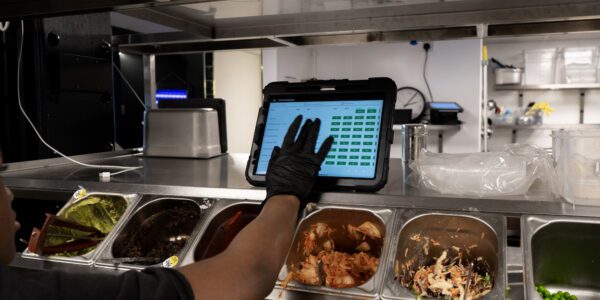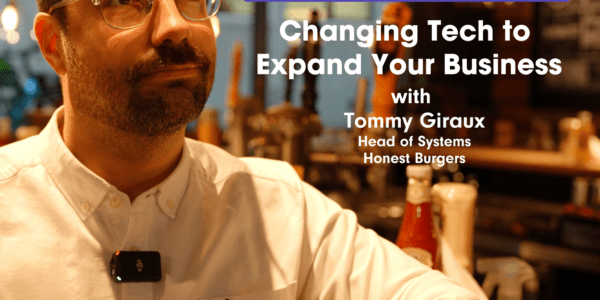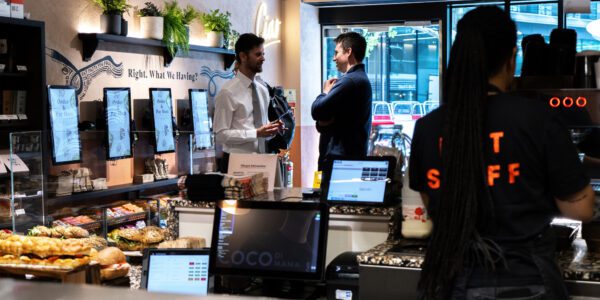The role of technology in driving efficiency
A look at technology’s role in driving efficiency for hospitality operations, and strategies you can implement today to get the most out of your tech.

Learn how to implement restaurant tech from the experts at two iconic brands: LEON and Tortilla.
One of the most exciting talks at the Hospitality Tech Expo 2023 saw hospitality podcaster Mark McCulloch joined by Mariam French – Marketing Director at LEON – and Andrew Brook – Head of IT at Tortilla – to record an episode of the Supersonic Hospitality Podcast live at the show.
It was a chance to hear how these iconic brands have approached digital implementation and strategy, from the experts within the businesses who are deeply involved in the process.
Interestingly, the brands are at very different stages of their digital journey. Both employ a single order management system, but whilst LEON currently utilises digital ordering in 50 of its 53 UK sites, Tortilla has just opened its first digital location in London Wall.
Discover the implementation tips and tricks shared during the conversation in our rundown of the top insights below.
“The Californian Taqueria is about the fun and the theatre of building the food, and seeing it built in front of you.
So I had a tough job on my hands when I came in earlier this year to really sell digital to our CEO more than anyone.
And he entrusted me to launch our concept store in London Wall, where we’ve partnered with Vita Mojo to go kiosk only for the first time.
It’s important to remember what the challenges are that we’re trying to overcome, and that’s ultimately throughput and serving customers quicker in our central London locations.”
“No one restaurant is the same. So how do we look at that guest journey and say where the kiosks are going to be versus the tills? How do we manage that guest flow of click and collect versus kiosk? We have to think about the interior layout and signage.
Initially, we were getting guest feedback saying, ‘We don’t understand why you’ve done this.’ And that was a real journey to try and shift that guest behaviour in our restaurants with correct signage and communication.
And now the good news is for the last 12 months, consistently, our ordering process gets really high ratings.”
“We pride ourselves that when you walk into a LEON, you should have an experience that’s full of sunshine. And before the introduction of digital ordering, you’d get that instant warmth as soon as you walked in and went to the till to place your order.
Now with guests having to go to the kiosks, our teams are saying “how do we give that big warm welcome? How do I give that sunny experience?”.
What we’ve had to do is just shift our thinking a little bit.
I put a lot of pressure on our digital providers, Vita Mojo, to make sure firstly that the ordering process is really functioning and that we’re not adding any hassle to a guest journey.
Secondly, does it look and feel vibrant? So that sunshine is coming across with the imagery, the colours, the food, does it still look delicious.
And the next bit was taking our team on a journey: when you’re handing over the food, that’s the opportunity to have that connection. You make eye contact, you have a little chat, call them by their name if it feels appropriate.”
“At the time when we were in a real labour shortage, actually, digital ordering enabled us to have that throughput and still be able to take all our guests’ orders, and just redeploy and shift teams.
So that was actually one of the reasons we could stay really agile and alive – effectively – and keep taking orders.
So it was really important from a functional perspective, and we had to take our teams along that journey as well. To say “This isn’t about robots taking your jobs, actually it’s to make your life easier, so you can focus on having that interaction and making sure food’s perfect every time.”
“It’s absolutely not a head-cutting exercise. That’s something important to remember.
As soon as our team members hear “self-service kiosk” they automatically think, “a robot is taking over my job”. But in London Wall, we’ve actually increased our labour by moving from one to three production lines that are back of house.”
“The important thing for me is I can now provide the data to make decisions and accurate, reliable data. Whereas previously we’ve struggled somewhat to be able to produce that.
We can make a decision based on reliable data – that’s so important in this day and age.
Having reliable data has to be at the heart of digital strategy, and understanding our customers when it’s cutthroat out there and we need every customer we can possibly get through the doors. Having data and understanding our customers is so vital and that should be the foundation of a digital strategy in my opinion.”
“We plot all our dishes by category: high margin, low margin, high sales, low sales. Then we’d plot the matrix so you know what your hero dishes are, you know what might need a little bit of a price increase.
We have digital screens in landscape orientation, and as well as a functional menu on there, we’ll also design takeovers with some big marketing messages. At the start of the year, we did some general designs on existing hero dishes. We actually saw 43% uplift on those hero dishes. Marketing works!”
“Everyone at LEON HQ has to use the app to place an order, so we’re our number one bug testers. We also have a certain amount of days that we go in and just test our kiosks in the restaurants.
Listen to your guests as well. Get your guest feedback directly into the teams that are doing digital implementation because it shouldn’t just sit as an IT project: make it the fabric of what you’re doing and be agile.”
“A really important decision for me was making sure that I partnered with the right company, and Vita Mojo have been great. They really understand our brand. They’re not just a technology company. They’re operators, they’re marketers. And they’ve been fantastic to work with on this project.”
Every operation has a different approach to digital. Book a chat with a restaurant tech expert below to discuss how it could look for yours.
A look at technology’s role in driving efficiency for hospitality operations, and strategies you can implement today to get the most out of your tech.


The right hospitality tech partner does more than provide software. They collaborate, innovate, and scale with your business.
